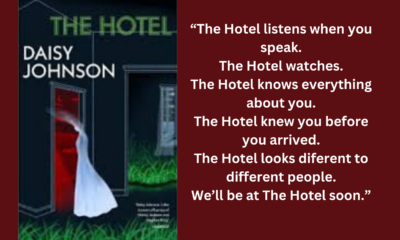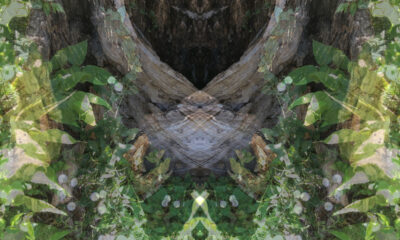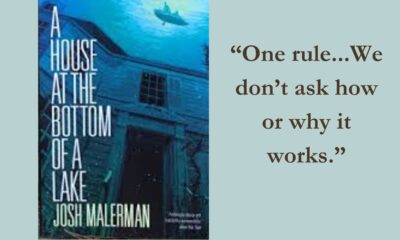
HauntedMTL Original: Black and Tan – M.E. Proctor
More Videos
Published
6 years agoon
By
Jim PhoenixBlack and Tan – M.E. Proctor
It’s been a long time coming…Horror…our very own for your filthy little eyes. M.E. Proctor produces some magic on the page here and I hope you enjoy it as much as we did.
-Doc
“It’s not a good idea, Lisa.”
“We talked about it.”
Yes, they did talk about it. Never in depth, always staying on the surface, a mention here and there, a possibility. Colin never paid much attention. Having a pet crept in their conversations at intervals, usually following some innocuous remark like ‘Greg and Josie’s dog died, poor thing, she was quite old, they’re thinking of getting another one,’ or ‘Clare asked me if I could feed her cat while she’s on business trip,’ accompanied by ‘isn’t she going on a three-week cruise in the fall?’ or something similar that left no trace on Colin’s mind.
“You remember the lab puppies we saw in the parking lot,” she said.
Seriously? Did she go all mushy again at the sight of some runt of the litter being hawked from the back of a pickup truck? “Was that guy out there again?” Colin said. “These people! You’d think they’d fix their dogs; not bring more unwanted creatures into the world.” It was shocking how some dog owners treated their animals in these parts. Irresponsible. Despicable. Every evening on his way home Colin saw his neighbor’s pitbull cruelly tethered to a short leash. It lunged at every passerby and jumped at all the cars, half-strangling itself in fury and frustration; the poor beast was outside, rain or shine, freeze or thaw. Every evening, Colin was one heartbeat away from calling animal protection on the guy, and neighborhood harmony be damned.
“Come on, Colin,” Lisa said. “You know I would never get a dog from the side of the road.”
That was not what he meant, not at all. He would without a second thought adopt a dog from the side of the road. A puppy thrown off a car, an abandoned stray, a jolly wanderer that ran with him on the jogging trail. But getting a dog from that sleazy guy in the Walmart parking lot? No way. Colin’s dislike had been immediate. It had nothing to do with the puppies. They were SPCA-ad ready, so sweet they made his molars ache. It was their owner that gave off a bad vibe. He talked to Lisa without looking at her, with that mixture of contempt and shyness that passed for masculinity in the trailer park set, a cigarette dangling between his fingers, faded jeans complementing muddy boots. When Lisa had asked if they were his dogs, she got a nod and a shrug for an answer, and a flat: “Givin’ ‘em away.” Lisa was indeed too sensible to get a dog from the back of a truck, and the man knew it. He took a card from his shirt pocket and handed it to her. “Droppin’ ‘em there, tonight.”
“I went to the shelter,” Lisa said.
She was holding that crumpled card with the smiling husky logo. The one the man had given her. She had kept it all that time. The encounter in the parking lot had left Colin with a vague unease that he had conveniently filed away under ‘creep making a pass at my wife.’ He was uncomfortably reminded of all the times when the pet topic had come up. It had seemed random, but it wasn’t. It always popped up when the house was too quiet in the evening. When the gibberish emanating from the TV didn’t dispel the gloom, or when the music blasting through the expensive sound system couldn’t fill the silence that took root between the notes. Because they weren’t really talking about getting a pet, of course; they were circling a chunk of dark matter, invisible and heavy, loaded with a toxic mix of sadness, regret and above all, emptiness.
Ten years earlier they had moved into their new home. They had hopes, they planned for the kids to come, they wondered if the place would be big enough, and worried about the precious travel keepsakes that they would soon have to move to safer, higher places. Now, the keepsakes that neither of them cared about anymore were still on the shelves, indifferent objects reminding them of everything that didn’t happen. Reminding them of what was missing. And the house was definitely too big.
“They have that cute puppy at the shelter. He’s perfect. You’ll see.”
Perfect. Perfect for what? Colin was upset she had gone to the shelter without telling him. How many times? More than once, for sure. It was infuriating that she had gone behind his back. She was telling him that she didn’t trust him. Not in these words, she would never say it so bluntly, but the meaning was clear. She had been hiding this from him because she knew he didn’t want a pet. He resisted lashing out with a stinging ‘why didn’t you get the dog already if you want it so much?’ It sounded petty and Colin didn’t want to sound petty; he didn’t want to be that kind of guy. Instead, he tried the rational, adult approach.
“You should think it over. What happens if the dog runs away, or gets hurt, or gets sick. It’ll break your heart.” And he didn’t say it, but he would be left with picking up the pieces.
Lisa shook her head. “That’s life, Colin.”
#
The kennels looked clean and well-maintained, with fresh food and plenty of water in the dishes, and the puppies seemed healthy. Not happy, no. How happy could they be locked up in a cage when all they wanted was to tumble and rumble in a soft patch of grass. Colin knelt in front of one of the metal boxes and reached for a soft black muzzle. Maybe this wasn’t such a bad idea after all. They were stuck in a routine. A change of pace could be good for them. He had his work to keep him busy but Lisa must be bored. He could see himself coming home to a running, ears flopping, paws pounding the floor loving mutt that would munch on his shoes, tear up his paper and make a mess in the kitchen. He patted the dog’s head and got a wet warm lick as a reward. Nobody had to teach these rascals how to melt a grown man’s heart. He looked up at Lisa, to ask her which one of these cute fur balls she planned to adopt. She had walked further down the row of cages and was about to turn a corner in the back. Colin stared at the puppy with regret. “Sorry, buddy,” he muttered. “Looks like my wife has her mind set on one of your compadres.” He jogged to catch up with Lisa and reached the corner in time to see her disappear behind a brick wall. The place was much larger than he thought.
As soon as Colin reached the brick wall, the stench assaulted him, sickly sweet and cloying with an undertone of something rotten, like tomatoes forgotten in the crisper. He wrinkled his nose. Maybe the place wasn’t as impeccably maintained as it seemed. Where had Lisa gone? He stood in a narrow alley between the wall and what looked like the side of an old barn. Lisa wasn’t anywhere near and he wondered if she had gone into the barn. He was about to look for an access when he heard her calling him. She stood in a patch of darkness further ahead.
“This way, behind the barn,” she said and was out of Colin’s sight again.
Where the hell was she going? There were no kennels in this area. The stench grew more intense, and the alley narrowed to the point that two people couldn’t walk side by side. Colin was sorry he had agreed to come. When he turned the corner the quality of the air changed again and not for the better; it carried sour fragrances, vaguely peppery and warm, something Colin instinctively associated with fear and prison. He was in some kind of lean-to shed, feebly lit by a couple of dirty bulbs hanging from the ceiling. Small cages were lined along the walls, stacked on top of each other, three high, impenetrable dark holes. There was life behind the bars, feverish small bodies, naked and shivering creatures, silent and watchful. Colin felt their unnaturally bright and keen eyes observing him. There was no hope and needful love in this ratty shack, only suffering. He fought an urge to puke and clenched a fist to feel the sharp pain of his nails digging in the palms of his hand. He grabbed one of the cages to steady himself and withdrew his hand in disgust when his fingers touched cold slimy metal.
“He’s here, in the back,” Lisa said.
Colin coughed; the stink was almost liquid; it clogged his sinuses.
“It smells like the dump,” he said. He felt sick, probably looked green. Not that anybody could see what he looked like in this gloomy light or cared that he was about to lose his breakfast. His wife certainly didn’t care. He felt a sudden surge of anger.
“It’s a puppy smell, Colin. They’re not trained yet. They’re only babies; they get upset stomachs and such. How would you feel if you were locked up in a cage all day long? You would be freaked out of your mind.”
Lisa sounded dismissive, borderline contemptuous. Colin was too proud to tell her to cut it short, get the damn dog and leave. He swallowed the revulsion rising in his throat and walked to the cage. There was marginally more light there thanks to a lantern hanging from a rusty hook. Enough light to see the dog standing with his nose against the bars. He didn’t back away when Lisa knelt down and reached for him. Colin thought the dog was an unusual color.
“Black and tan,” Lisa said, as if she’d read his mind.
Was that the correct technical term? Colin didn’t think the label fit this dog. His coat was a glossy black, rich and deep, almost oily in its slickness; the belly, the paws and the tip of the tail were a flaming red, flashing in the darkness like the lining of a magician’s cloak. He looked like a terrier with straight and pointed ears and a square muzzle. A pure white crescent slashed between the hard, shiny eyes.
“He’s stunning, don’t you think?” Lisa said. The puppy was licking her fingers through the bars. She was smiling brightly.
A current of hatred so violent that it rocked him on his feet went through Colin. It stunned him and scrambled his thoughts. The feral smell was forgotten. All he saw was his wife on her knees smiling at this dog in a way she had never smiled at him. She looked pure, beautiful and young. Like a new bride, he thought, but not my bride. It should have made him fall in love with her all over again, it should have opened his heart in joy, but all he felt was overwhelming fury. At the dog. At Lisa.
“He’s really special,” she said.
Colin couldn’t speak. Blind rage has no use for words.
Lisa was babbling away. “He’s not pure breed, of course.”
Of course!
“He’s a mix. They’re smarter than the pure breeds.” She turned to Colin. “You don’t expect a pedigree certificate, I hope!”
Her unexpected vehemence acted like a cold shower on Colin’s fraying temper. What had just happened to him? For a moment there, he had been beside himself.
“So, little lady, will you take him?”
Colin jumped, startled. He hadn’t heard anybody approaching.
“Hello, Mr. Macklin. Yes, I’ll take him. He already loves me as much as I love him.”
Colin had never heard Lisa speak in that shy, tentative voice. She sounded like a little girl who wanted to please and that wasn’t like her at all. Was she intimidated by this ragged old man for some reason? The guy certainly didn’t look threatening. A wash-out in Colin’s opinion, probably younger than he looked, too thin, too pale, in that scrawny backwoods way that told of a hard life lived in close companionship with bad habits. The faded sagging jeans and the ratty sweater looked clean; at least he didn’t smell like his wards. Macklin produced a large antique key and opened the cage. The puppy jumped in Lisa’s arms.
Macklin looked at Colin. “He’s had all his shots,” he said. “No worries.”
As if that was what worried Colin. He wasn’t sure what he worried about, but it sure wasn’t a vaccine. The cage door banged shut with a deep metallic noise. It must have been heavier than it looked.
“We came to see the dog,” Colin said. “We haven’t made a decision about adopting him yet.” It was a feeble attempt at resistance. He didn’t think it would take him very far. Lisa was completely sold on the animal.
Macklin looked at Lisa with a questioning expression. He rattled his keyring against the cage. It put Colin’s teeth on edge.
“That puppy is made for you, sweetie,” Macklin said. A hint of a smile played on his pale lips.
Colin felt himself go cold. If it was a marketing ploy, the guy didn’t even attempt to be subtle. One look at Lisa was enough to tell him he had caught himself one big gullible fish.
Lisa cradled the dog, her mouth close to his nose. “How much?” she said in that baby voice.
Macklin quoted a price that seemed ridiculously low to Colin.
#
“Don’t you think he’d be better in the utility room?” Colin said.
The drive home had been uncomfortably silent. Lisa sat in the back with the dog in her lap, wrapped in a blanket. She was lost in contemplation of her new toy.
The puppy had jumped from Lisa’s arms as soon as he had opened the front door.
“It’s like he knows the house,” Colin mumbled.
The dog trotted trotted down the hallway and went straight up the stairs leading to the second floor without paying any attention to the rooms on the ground floor. He sniffed the carpet in front of the master bedroom but did not go in. He went to the next room instead. For some reason the door was open and it gave Colin a nasty jolt. That door was always locked. Had Lisa broken their unspoken convention? One day, years ago, they had pulled the door shut and never set foot in the room again. This property is condemned. They could have made an office out of it, or a sowing room, maybe, if Lisa had stuck with quilting, but they had never discussed any remodeling, out of superstition, or maybe some pagan fear of desecration. The place was cold and desolate, left behind, uncared for. The furniture had gathered dust. The flowery wallpaper had faded. The window was dirty, with ragged cobwebs hanging in the corners.
On the floor plan, on that spot, the architect had written Nursery.
They both stood in front of the open door. Lisa was too cheerful. Colin felt increasingly glacial.
“We should keep him downstairs,” Colin said. He was tired and his protest sounded as tired as he was. I object for the record, he thought, absurdly. He could have stopped her cold with a single sentence this is the baby’s roombut he could not bring himself to hurt her. Cruelty was not in his nature, no matter how upset he was. Lisa walked into the room and put a brand-new wicker basket under the window. When did she buy that? She patted the red cushion garnishing the bottom, enticing the dog to try his bed. Colin watched, detached. He was letting go and it felt sickly satisfying. She wanted this? Let her have it, warts and all. The hatred that burned him at the shelter was such a distant memory he had trouble recalling the feeling.
“You’ll be fine here,” Lisa said. “I’ll get you some food and water.”
“Lisa…” Colin said. That was his last gasp of resistance.
“Ramus chose his room,” Lisa said.
The dog had a name. He had been baptized. Colin didn’t linger. There was a residual smell of the shelter in the room and it was more than he could bear.
#
Two months later Colin was promoted to sales manager. He was away on business more often, worked late, and went to the office on most week-ends. Lisa didn’t comment on the change in his routine; she didn’t seem to notice and Colin snapped at her. “You don’t give a shit if I’m home or not!” She shrugged and he didn’t know what else to say. He was late for a meeting and stressed out by an important presentation to a new client, and he let it slide.
One afternoon, back from a road trip, he happened to drive by the animal shelter. What went through his mind was unclear. Maybe he was thinking of the soft brown puppy that had licked his fingers, maybe he was pining for a reenactment of some sort. He parked and went in, determined to turn back and leave at the first whiff of the dreadful stench that had nearly knocked him out on his previous visit.
It was spring, the sun was bright, the puppies looked healthy and playful, and all Colin smelled was honeysuckle with a hint of bleach in the background like a bathroom after a thorough scrubbing. He got close to the cages, reached in, got a lick from a wet tongue and felt guilty for being there and giving a little one a glimmer of hope that would never be fulfilled. He walked along the kennels, looking for the brick wall, the barn and the shed at the end of the narrow passage. The place had seemed big last time, but it wasn’t more than six rows of metal cages and a grassy playpen that he hadn’t noticed before. A few dogs were having a jolly good time running around. He went past the last cage and there it was. Well, not exactly. The wall was lower than he remembered and covered with luxuriant blooming honeysuckle vines. The scent that was pleasant near the entrance of the kennels was too sweet and overpowering at close quarters. Colin walked around the wall, expecting to find himself in the familiar narrow alley. He encountered a barbed wire fence instead. There was no barn, no shed, only a rolling pasture. A few cows gathered around a clump of trees, in the distance.
“Can I help you?”
A smiling young woman emerged from the tangle of honeysuckle, a pair of clippers in hand.
“I’m Jenny Dillon.”
“Colin Farnsworth,” he said.
She pulled off a garden glove and they shook hands.
She sighed. “These plants are taking over. Soon I’ll have to go at them with an ax!”
“The perfume is a tad heavy.”
“It’s a little much, I agree. Are you here to adopt a puppy or do you have an animal to board?”
Colin wished he had thought of a cover story before walking in. “I came here with my wife a few months ago. I was in the neighborhood and I wanted to have another look.” He shook his head. “I have a hard time deciding.”
Jenny chuckled. “The more puppies you see, the harder it gets! What size animal are you thinking of? For a grown-up dog, I mean.”
Colin didn’t want to be dragged back to the kennels. “You made some changes. What happened to the barn that was here?”
“A barn?” Jenny frowned. “There was one when my father bought this place. An eyesore. We had to tear it down. It was falling to pieces.” She looked at Colin, puzzled. “That was years ago. You’re sure you’re not thinking of another place? Plenty of farms with barns around here.”
Colin was as puzzled as she was. “I guess my memory isn’t as good as I think it is.” There was nothing wrong with his memory. What was going on here? He pointed at the honeysuckle. “I remember this wall. I couldn’t figure why it was there.” He didn’t say that in his recollection, there was not a twig of honeysuckle clinging to the bricks.
“It’s what’s left of the old farm. It makes a pretty backdrop for the kennels, with the climbing vines and all, very picturesque. When Mom planted these, she never thought they would get so big. Talk about invasive!”
“The soil must be full of nutrients,” Colin said, distractedly. He was thinking of the wall that had been much higher, and the barn that was nowhere near collapsing when he walked by it, and the shed with its dirty light bulbs. And old man Macklin with his medieval key. He might not yet fully qualify for the funny farm but reality was definitely starting to feel slippery.
“I wouldn’t know,” Jenny said.
Her voice was different, cold, hostile. Her entire behavior had changed. There was nothing left of the friendly woman of a few minutes ago. It was as if a sudden gust of arctic wind had blown in from the north.
“The dogs are this way. I’ll show you our new arrivals.”
She was professional and curt. She walked back to the kennels, leaving Colin standing by the brick wall. Was it something he said? He couldn’t remember what he said. Foreboding, like a thin sharp blade, was slicing between his ribs, aiming for the heart. He ran after her.
“Ms. Dillon? Is something wrong?”
“I… Nothing, it’s nothing. I just remembered the receptionist isn’t here today and the phone is probably ringing like mad. Please, take your time. Let me know if you need anything. I’ll be in the office.”
It was the wall. It had to be. He had said something about the honeysuckle going gangbuster. No, that wasn’t it. Something about the fertile soil? It was an innocuous remark. It had spooked her somehow. He made one last attempt.
“Ms. Dillon? Do you have a business card? I can’t stay much longer but I’ll call once we’re close to a decision.”
The card said Dillon Kennelsin a plain bold font; the silhouette of a German shepherd adorned the right top corner. There was no smiling husky.
#
After his visit to the kennels, Colin had driven down unknown country roads and got lost. He tried to gather his thoughts and couldn’t make sense of what he had seen. Going to the office was out of the question. He couldn’t focus. He decided to go home. Lisa didn’t expect him for at least another hour and he wondered what she was doing when he wasn’t around. He liked the idea of surprising her. He felt weirdly excited. It was somewhat perverse, like spying on her.
He walked in through the garage. Lisa’s car was parked in its usual spot. She had to be home but the house was eerily silent. The kitchen was clean, no dishes on the counter or in the sink. The sitting room and the dining room were cold and dark.
Colin stood at the foot of the stairs, listening. “Lisa?”
The silence was unnerving. She could have gone out on foot. It was a beautiful day, a perfect day for a walk, but she was home, wasn’t she? Of course, she was. Colin went up the stairs.
The door of the nursery was closed. Colin raised a hand to knock, hesitated, and opened the door. It was his home after all, why should he knock? The stench attacked him like a rabid animal. It froze him on the threshold. The curtains were closed and the room was dim. He hit the light switch. The last time he had been in there was when they brought the dog home. He didn’t recognize anything. There was a crib, a playpen, shelves with colorful books, toys on the floor. The wallpaper was gone, replaced by a fresh coat of pale blue paint. Blue is for boys, Colin thought, and his heart missed a beat. Lisa was a pale figure sitting in a big armchair by the window; heavy blue velvet curtains framed her like a precious doll in a collector’s display cabinet.
She looked at him. Her eyes were cold, iced over. “You’re back early,” she said.
Colin forced himself to move and took a step inside. “What is this, what have you done? This room… What does it mean? Where’s the dog?” Questions rushed in his head.
Lisa came toward him, pushed him out, closed the door behind her, and locked it.
“That smell. The dog is sick. Let me see,” Colin said.
“Ramus is fine. Let’s go down.”
“You rearranged the room. Why?” Of all the crazy things he’d seen in that room, the crib stuck in his mind. That was a sacred object, something nobody should mess with. He had noticed a rumpled blanket in the crib. He grabbed Lisa by the shoulders, shook her, yelled incoherent questions at her, begged her to make sense of the insanity. She stared at him with an indifferent expression and slipped out of his trembling hold. He had neither the strength nor the will to force her. Force her to do what? To say what? Why wasn’t the world behaving in a reasonable way? He was a reasonable man. He had no taste for the irrational and the inexplicable.
“You’re being foolish, Colin,” Lisa said. “Did something happen at the office?”
“The nursery,” he mumbled.
She sighed. “I don’t want to talk about it.” She was going down the stairs, her back to him, her voice fading in the darkness of the stairwell. Everybody was walking away from him it seemed. First Jenny, now Lisa. “It’s my thing, Colin, my reasons.” She shrugged. “You’ll think it’s stupid, and I don’t want to discuss it. I’m hopeful, okay? That’s all I’ll say about it.”
Hopeful? It hurt to ask but he had to know. “Did you see the doctor?”
She said she didn’t need to talk to any doctor. She was hopeful and wasn’t state of mind half the battle won? Colin almost believed her because he so wanted to believe.
#
Nothing makes you more aware that a relationship has steadily deteriorated than a sudden change in the status quo. Colin realized that his marriage had been in a deep freeze when the ice started to melt. He knew he was to blame; he was away from home too much, he was too absorbed by work, and he had taken Lisa for granted. Because she never complained it had been easy to conclude that everything was fine. After what Colin labeled the crib incident, the mood around the house changed. For the past year, their sex life had been so-so, indifferent, academic almost. Now Lisa showed renewed interest, and an eagerness that she had never displayed, not even in the first months of their relationship. Colin was pleasantly, however cautiously, surprised. Maybe Lisa was right and they had given up hope too soon. Sprucing up the nursery had been her way to signal that she was ready to try again. You read about this in the health pages of the paper. The psychological context. Mind over matter. That kind of thing. Colin kept his doubts and his ruminations for himself; he didn’t want to jinx it. He tried to forget his disturbing visit to the kennels, stayed away from the nursery, and decided that he was probably unusually sensitive to animal smells, probably allergic. He deliberately ignored the weirdness behind Lisa’s eyes, the tension he felt in her body, the way she threw herself into sex, with a devil-may-care attitude that was at once exciting and disturbing. He couldn’t help falling asleep as soon as he rolled off her, and if he dreamed, there was nothing left of his dreams when morning came. Nights were black, opaque, one solid block, obsidian hard, that he was afraid to chip at.
#
“Colin, you look terrible,” his assistant said. “You must be coming down with the flu. There’s a bug doing the rounds. You should go home.”
Home. He dreaded going home. He would gladly embrace a flu of pandemic magnitude if it kept him in the hospital or anywhere but home.
“I can’t, it’s budget crunch time,” he said. “I’m not contagious, Annie, I just don’t sleep well right now.” He was putting it mildly. He barely slept at all. The improvement in his marital life had not lasted. He now marveled that he had once thought there was an improvement. Lisa had turned into a stranger. Their lovemaking had gotten increasingly creepy, quick and brutal, with her turning away from him and running to the bathroom as soon as he had climaxed. She was never one for sweet nothings and cuddling afterwards but she used to enjoy falling asleep by his side, and he enjoyed feeling her warmth an arm’s length away. Her practicality–was that the right word?–was chilling. When she came back to bed after the shower, she didn’t say a word to him. She turned on her side, pulled up the covers and pretended to fall asleep. He lay there, motionless, rigid, every muscle in his body turning to stone. His sleep was fitful and troubled and when he woke up in the middle of the night, he was alone. Her side of the bed was cold. No noise, not a whisper came from the nursery, but he didn’t need to check, he knew she was in there, with the dog.
Colin saw the animal occasionally, always from the corner of his eye, a black shape slinking away in silence. Never a bark even when the doorbell rang to signal some delivery or the rare neighborly visit. They had never entertained much but over the past year–isn’t it more like nine months, since we brought the dog home–they hadn’t welcomed any friends to the house. He had business dinners and lunches, and cocktail parties. Lisa used to accompany him but she had made it clear she wasn’t interested anymore. She rarely left the house. Colin was doing most of the grocery shopping on his way back from work. Because it was more efficient…
“You should take a power nap,” Annie, the assistant, said. “I read they work wonders.” She smiled. “Mr. Sanderson is out today. There’s a comfortable couch in his office. Why don’t you lay down for an hour or so. Then you can tackle the budget!”
She opened the locked office for him. Her voice was soft and warm. Lisa wouldn’t give him that much.
#
Colin smelled the dog’s funk as soon as he opened the front door. The walls were oozing the poisonous stench. The nausea surged with irrepressible force and he vomited on the carpet of the hallway. Whatever he had experienced at the shelter was nothing compared to this. He stumbled into the guest bathroom and closed the door behind him. It blocked the offensive smell and he immediately felt better. He splashed cold water over his face and gurgled to clean his mouth. There was no way he could remain in the house if he had to share it with the dog. For all he knew his health might be at risk. He had slept for three hours on Sanderson’s couch. Annie had woken him up when she left for the day. She was worried about him, he could tell. He wasn’t going to put his life or his career at risk for the sake of a mangy dog! He went to the sitting room and poured himself a stiff Scotch. No ice, barely a dash of water. It drew a band of fire in the pit of his stomach. Liquid courage! It was pathetic but he needed every drop of it to face what waited for him upstairs. A cold woman and a small dog. Laughable, absurd! He knew what his father and his friends would say. Give the woman a piece of your mind and throw the doggie out. If only it was that simple. The image of the bare brick wall at the kennels popped into his head and he pushed it away. It had to have been a hallucination caused by the allergy. It was conceivable, wasn’t it? It had all been in his head. There had been no barn and no lean-to shed. No Macklin. He poured another drink and downed it in one long swallow. Macklin. Could he have imagined him too? Anything was possible in his distraught condition. Then why didn’t he ask Jenny Dillon if she knew an old man by that name? Because he had been afraid of getting an answer? He had looked Macklin up online and had come up empty-handed. He had also looked up the Dillon property in the county tax records. Avery Dillon had bought the place ten years earlier, from a local bank that had held it for as far as the digital records went. Colin had not pursued further. He could have gone to the tax office and looked at older records, he could have called the bank, or contacted Jenny again. He did none of these things. What good would it do? If reality wasn’t anchored rock solid, it was as shifty as quicksand and he was sinking.
Either the smell had abated slightly or the whisky was wrapping him in its vapors. Time to go before the effect dissipated; he would never be more ready. He went up the stairs.
A small desk lamp was the nursery’s sole source of light. It bathed Lisa in a soft glow that didn’t spread beyond her armchair. She sat facing the window like before. Her naked shoulders emerged from a loose silk bathrobe, glossy white, as polished as marble. Colin leaned on the door jamb. It was a picture worthy of an old Dutch master, with the light delicately brushing her hair and the folds of the robe. He felt a heart-stopping stab of love for her. She was more lovely sitting there than she had been walking down the aisle, that day long ago. She turned to face him and the delightful picture of warm homeliness shattered. Ramus was in her lap, black and shiny. His head rested against her chest in a ghastly parody of the Madonna and Child, his paws buried in her shimmering robe. Colin couldn’t tear his eyes away from the dog, from his wife’s full breasts, from the sweat glistening between them, from the swollen nipples.
Ramus jumped off and pawed toward Colin. Some people say that dogs can smile. If that was a smile, it was a smug satisfied one. Satisfied and fed. The dog stopped a few steps away. He wasn’t a puppy anymore. He was the size of a spaniel but more compact, muscular and short-legged. Colin’s heart was in his throat. This dog was built for strength and speed.
“You don’t look well,” Lisa said.
As if her words had summoned it, the thick animal smell washed over Colin and he staggered. He leaned on a credenza to steady himself. “This is so wrong,” he muttered. “This dog has to go, Lisa. He’s poisoning me. And he’s doing something to you…”
She stood up, not bothering to close her robe. She was extremely beautiful in that state of sensual untidiness. Colin’s senses were in chaos. He was sick to his stomach, slightly drunk and overcome with desire for her.
For a brief, fatal moment he forgot about the dog.
“Ramus,” Lisa said, sharply.
One last thought went through Colin’s mind as the dog’s fangs shredded his wrists, just before pain obliterated everything.
He’s had had all his shots, no worries.
M.E. Proctor worked as a communication professional and a freelance journalist. After completing a cycle of science fiction chronicles, she wanted to explore new themes and is currently working on a series of contemporary detective novels.
When she needs a break from obsessing about her fictional private investigator, she writes short stories. They all tend to be a little unsettling. It is no accident.
Her work has been published, both in the U.S. a

Real skull. Don't ask. You wouldn't believe it if I told you.

You may like
Original Creations
Goodbye for Now, a Short Story by Jennifer Weigel
Published
2 days agoon
March 30, 2025What if ours weren’t the only reality? What if the past paths converged, if those moments that led to our current circumstances got tangled together with their alternates and we found ourselves caught up in the threads?
Marla returned home after the funeral and wake. She drew the key in the lock and opened the door slowly, the looming dread of coming back to an empty house finally sinking in. Everyone else had gone home with their loved ones. They had all said, “goodbye,” and moved along.
Her daughter Misty and son-in-law Joel had caught a flight to Springfield so he could be at work the next day for the big meeting. Her brother Darcy was on his way back to Montreal. Emmett and Ruth were at home next door, probably washing dishes from the big meal they had helped to provide afterward, seeing as their kitchen light was on. Marla remembered there being food but couldn’t recall what exactly as she hadn’t felt like eating. Sandwiches probably… she’d have to thank them later.
Marla had felt supported up until she turned the key in the lock after the services, but then the realization sank deep in her throat like acid reflux, hanging heavy on her heart – everyone else had other lives to return to except for her. She sighed and stepped through the threshold onto the outdated beige linoleum tile and the braided rag rug that stretched across it. She closed the door behind herself and sighed again. She wiped her shoes reflexively on the mat before just kicking them off to land in a haphazard heap in the entryway.
The still silence of the house enveloped her, its oppressive emptiness palpable – she could feel it on her skin, taste it on her tongue. It was bitter. She sighed and walked purposefully to the living room, the large rust-orange sofa waiting to greet her. She flopped into its empty embrace, dropping her purse at her side as she did so.
A familiar, husky voice greeted her from deeper within the large, empty house. “Where have you been?”
Marla looked up and glanced around. Her husband Frank was standing in the doorway to the kitchen, drying a bowl. Marla gasped, her hand shooting to her mouth. Her clutched appendage took on a life of its own, slowly relinquishing itself of her gaping jaw and extending a first finger to point at the specter.
“Frank?” she spoke hesitantly.
“Yeah,” the man replied, holding the now-dry bowl nestled in the faded blue-and-white-checkered kitchen towel in both hands. “Who else would you expect?”
“But you’re dead,” Marla spat, the words falling limply from her mouth of their own accord.
The 66-year old man looked around confusedly and turned to face Marla, his silver hair sparkling in the light from the kitchen, illuminated from behind like a halo. “What are you talking about? I’m just here washing up after lunch. You were gone so I made myself some soup. Where have you been?”
“No, I just got home from your funeral,” Marla spoke quietly. “You are dead. After the boating accident… You drowned. I went along to the hospital – they pronounced you dead on arrival.”
“I don’t know what you’re talking about,” Frank said. “What boating accident?”
“The sailboat… You were going to take me out,” Marla coughed, her brown eyes glossed over with tears.
“We don’t own a sailboat,” Frank said bluntly. “Sure, I’d thought about it – it seems like a cool retirement hobby – but it’s just too expensive. We’ve talked about this, we can’t afford it.”
Marla glanced out the bay window towards the driveway where the small sailboat sat on its trailer, its orange hull reminiscent of the Florida citrus industry, and also of the life jacket Frank should have been wearing when he’d been pulled under. Marla cringed and turned back toward the kitchen. She sighed and spoke again, “But the boat’s out front. The guys at the marina helped to bring it back… after you… drowned.”
Frank had retreated to the kitchen to put away the bowl. Marla followed. She stood in the doorway and studied the man intently. He was unmistakably her husband, there was no denying it even despite her having just witnessed his waxen lifeless body in the coffin at the wake before the burial, though this Frank was a slight bit more overweight than she remembered.
“Well, that’s not possible. Because I’m still here,” Frank grumbled. He turned to face her, his blue eyes edged with worry. “There now, it was probably just a dream. You knew I wanted a boat and your anxiety just formulated the worst-case scenario…”
“See for yourself,” Marla said, her voice lilting with every syllable.
Frank strode into the living room and stared out the bay window. The driveway was vacant save for some bits of Spanish moss strewn over the concrete from the neighboring live oak tree. He turned towards his wife.
“But there’s no boat,” he sighed. “You must have had a bad dream. Did you fall asleep in the car in the garage again?” Concern was written all over his face, deepening every crease and wrinkle. “Is that where you were? The garage?”
Marla glanced again at the boat, plain as day, and turned to face Frank. Her voice grew stubborn. “It’s right here. How can you miss it?” she said, pointing at the orange behemoth.
“Honey, there’s nothing there,” Frank exclaimed, exasperation creeping into his voice.
Marla huffed and strode to the entryway, gathering her shoes from where they waited in their haphazard heap alongside the braided rag run on the worn linoleum floor. She marched out the door as Frank took vigil in its open frame, still staring at her. She stomped out to the boat and slapped her hand on the fiberglass surface with a resounding smack. The boat was warm to the touch, having baked in the Florida sun. She turned back towards the front door.
“See!” she bellowed.
The door stood open, empty. No one was there, watching. Marla sighed again and walked back inside. The vacant house once again enveloped her in its oppressive emptiness. Frank was nowhere to be found.

So I guess it’s goodbye for now. Feel free to check out more of Jennifer Weigel’s work here on Haunted MTL or here on her website.
Today on Nightmarish Nature we’re gonna revisit The Blob and jiggle our way to terror. Why? ‘Cause we’re just jellies – looking at those gelatinous denizens of the deep, as well as some snot-like land-bound monstrosities, and wishing we could ooze on down for some snoozy booze schmoozing action. Or something.
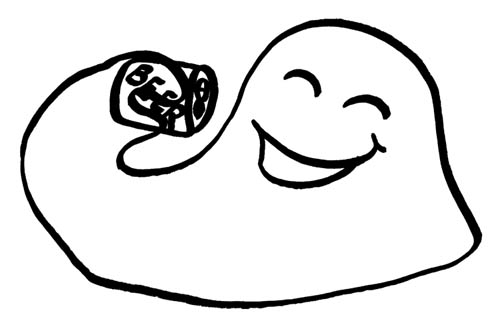
Honestly, I don’t know what exactly it is that jellyfish and slime molds do but whatever it is they do it well, which is why they’re still around despite being among the more ancient organism templates still in common use.
Jellyfish are on the rise.
Yeah, yeah, some species like moon jellies will hang out in huge blooms near the surface feeding, but that’s not what I meant. Jellyfish populations are up. They’re honing in on the open over-fished ocean and making themselves at home. Again.
And, although this makes the sea turtles happy since jellies are a favorite food staple of theirs, not much else is excited about the development. Except for those fish that like to hide out inside of their bells, assuming they don’t accidentally get eaten hanging out in there. But that’s a risk you gotta take when you’re trying to escape predation by surrounding yourself in a bubble of danger that itself wants to eat you. Be eaten or be eaten. Oh, wait…
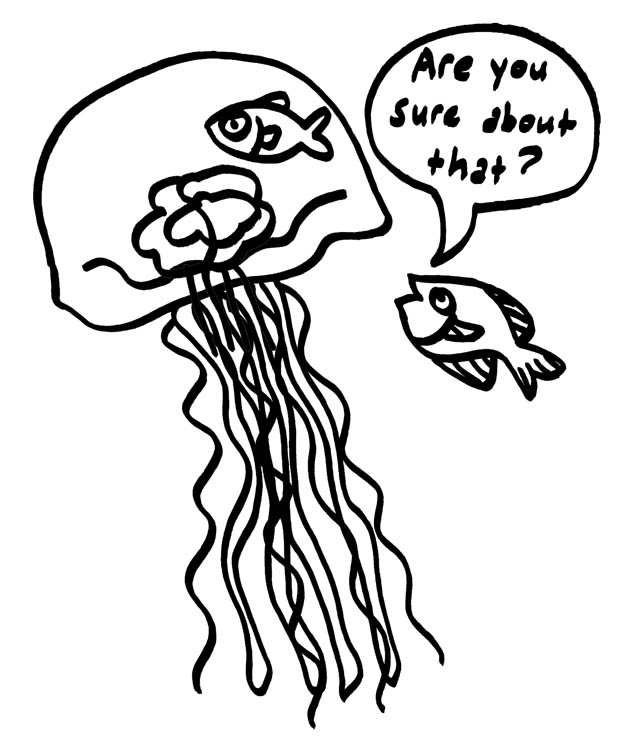
So what makes jellies so scary?
Jellyfish pack some mighty venom. Despite obvious differences in mobility, they are related to anemones and corals. But not the Man o’ War which looks similar but is actually a community of microorganisms that function together as a whole, not one creature. Not that it matters when you’re on the wrong end of a nematocyst, really. Because regardless what it’s attached to, that stings.
Box jellies are among the most venomous creatures in the world and can move of their own accord rather than just drifting about like many smaller jellyfish do. And even if they aren’t deadly, the venom from many jellyfish species will cause blisters and lesions that can take a long time to heal. So even if they do resemble free-floating plastic grocery bags, you’d do best to steer clear. Because those are some dangerous curves.
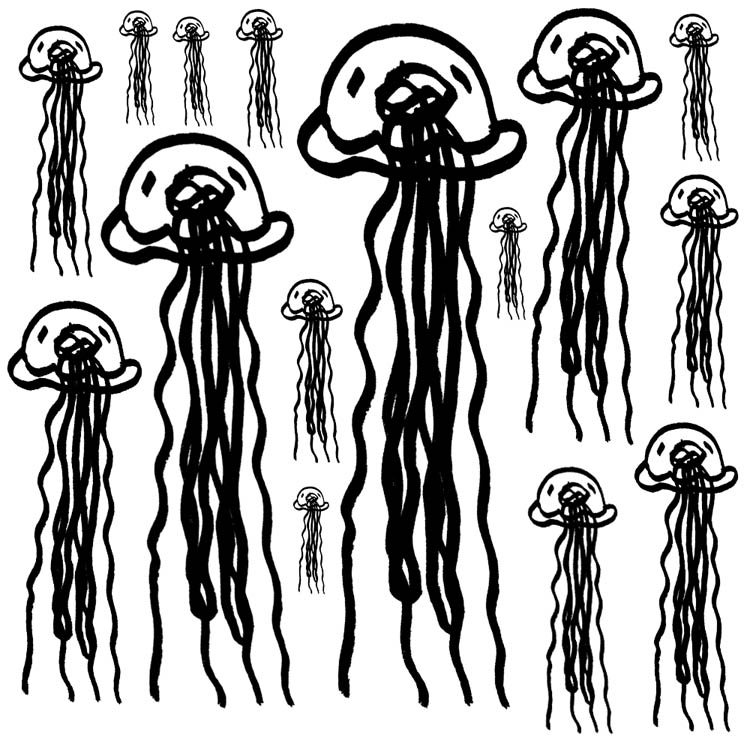
But what does this have to do with slime molds?
Absolutely nothing. I honestly don’t know enough about jellyfish or slime molds to devote the whole of a Nightmarish Nature segment to either, so they had to share. Essentially, this bit is what happened when I decided to toast a bagel before coming up with something to write about and spent a tad too much time in contemplation of my breakfast. I guess we’re lucky I didn’t have any cream cheese or clotted cream…
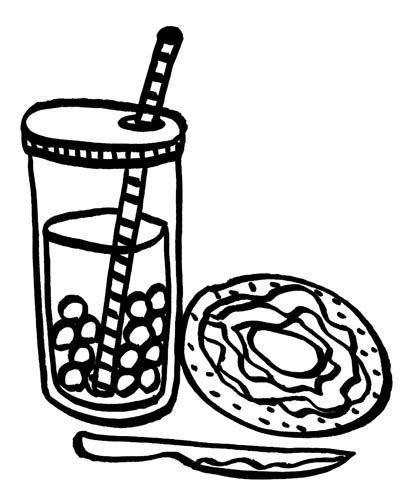
Oh, and also thinking about gelatinous cubes and oozes in the role-playing game sense – because those sort of seem like a weird hybrid between jellies and slime molds, as does The Blob. Any of those amoeba influenced creatures are horrific by their very nature – they don’t even need to be souped up, just ask anyone who’s had dysentery.
And one of the most interesting thing about slime molds is that they can take the shortest path to food even when confronted with very complex barriers. They are maze masterminds and would give the Minotaur more than a run for his money, especially if he had or was food. They have even proven capable of determining the most efficient paths for water lines or railways in metropolitan regions, which is kind of crazy when you really think about it. Check it out in Scientific American here. So, if we assume that this is essentially the model upon which The Blob was built, then it’s kind of a miracle anything got away. And slime molds are coming under closer scrutiny and study as alternative means of creating computer components are being explored.
Jellies are the Wave of the Future.
We are learning that there may be a myriad of uses for jellyfish from foodstuffs to cosmetic products as we rethink how we interact with them. They are even proving useful in cleaning up plastic pollution. I don’t know how I feel about the foodstuff angle for all that they’ve been a part of various recipes for a long time. From what I’ve seen of the jellyfish cookbook recipes, they just don’t look that appealing. But then again I hate boba with a passion, so I’m probably not the best candidate to consider the possibility.
So it seems that jellies are kind of the wave of the future as we find that they can help solve our problems. That’s pretty impressive for some brainless millions of years old critter condiments. Past – present – perpetuity! Who knows what else we’d have found if evolution hadn’t cleaned out the fridge every so often?
Feel free to check out more Nightmarish Nature here.
Original Series
Lucky Lucky Wolfwere Saga Part 4 from Jennifer Weigel
Published
2 weeks agoon
March 17, 2025Continuing our junkyard dawg werewolf story from the previous St. Patrick’s Days… though technically he’s more of a wolfwere but wolfwhatever. Anyway, here are Part 1 from 2022, Part 2 from 2023 and Part 3 from 2024 if you want to catch up.
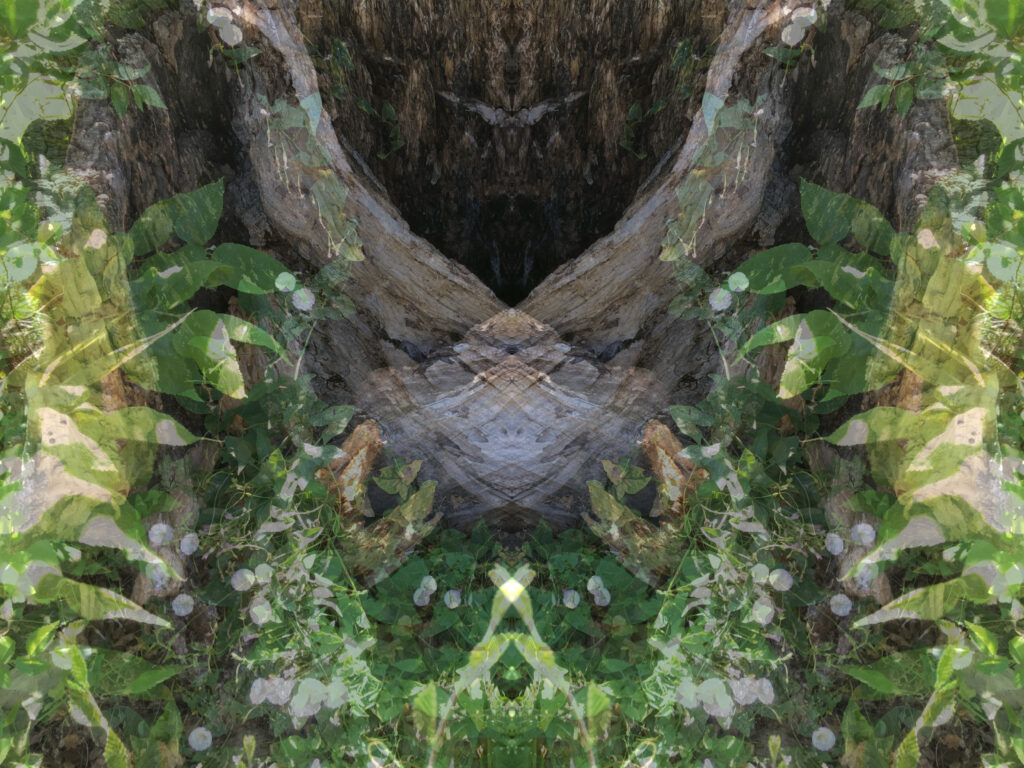
Yeah I don’t know how you managed to find me after all this time. We haven’t been the easiest to track down, Monty and I, and we like it that way. Though actually, you’ve managed to find me every St. Patrick’s Day since 2022 despite me being someplace else every single time. It’s a little disconcerting, like I’m starting to wonder if I was microchipped way back in the day in 2021 when I was out lollygagging around and blacked out behind that taco hut…
Anyway as I’d mentioned before, that Scratchers was a winner. And I’d already moved in with Monty come last St. Patrick’s Day. Hell, he’d already begun the process of cashing in the Scratchers, and what a process that was. It made my head spin, like too many squirrels chirping at you from three different trees at once. We did get the money eventually though.
Since I saw you last, we were kicked out of Monty’s crap apartment and had gone to live with his parents while we sorted things out. Thank goodness that was short-lived; his mother is a nosy one for sure, and Monty didn’t want to let on he was sitting on a gold mine as he knew they’d want a cut even though they had it made already. She did make a mean brisket though, and it sure beat living with Sal. Just sayin.
Anyway, we finally got a better beater car and headed west. I was livin’ the dream. We were seeing the country, driving out along old Route 66, for the most part. At least until our car broke down just outside of Roswell near the mountains and we decided to just shack it up there. (Boy, Monty sure can pick ‘em. It’s like he has radar for bad cars. Calling them lemons would be generous. At least it’s not high maintenance women who won’t toss you table scraps or let you up on the sofa.)
We found ourselves the perfect little cabin in the woods. And it turns out we were in the heart of Bigfoot Country, depending on who you ask. I wouldn’t know, I’ve never seen one. But it seems that Monty was all into all of those supernatural things: aliens, Bigfoot, even werewolves. And finding out his instincts on me were legit only added fuel to that fire. So now he sees himself as some sort of paranormal investigator.
Whatever. I keep telling him this werewolf gig isn’t all that it’s cracked up to be, and it doesn’t work like in the movies. I wasn’t bitten, and I generally don’t bite unless provoked. He says technically I’m a wolfwere, to which I just reply “Where?” and smile. Whatever. It’s the little things I guess. I just wish everything didn’t come out as a bark most of the time, though Monty’s gotten pretty good at interpreting… As long as he doesn’t get the government involved, and considering his take on the government himself that would seem to be a long stretch. We both prefer the down low.
So here we are, still livin’ the dream. There aren’t all that many rabbits out here but it’s quiet and the locals don’t seem to notice me all that much. And Monty can run around and make like he’s gonna have some kind of sighting of Bigfoot or aliens or the like. As long as the pantry’s stocked it’s no hair off my back. Sure, there are scads of tourists, but they can be fun to mess around with, especially at that time of the month if I happen to catch them out and about.
Speaking of tourists, I even ran into that misspent youth from way back in 2021 at the convenience store; I spotted him at the Quickie Mart along the highway here. I guess he and his girlfriend were apparently on walkabout (or car-about) perhaps making their way to California or something. He even bought me another cookie. Small world. But we all knew that already…
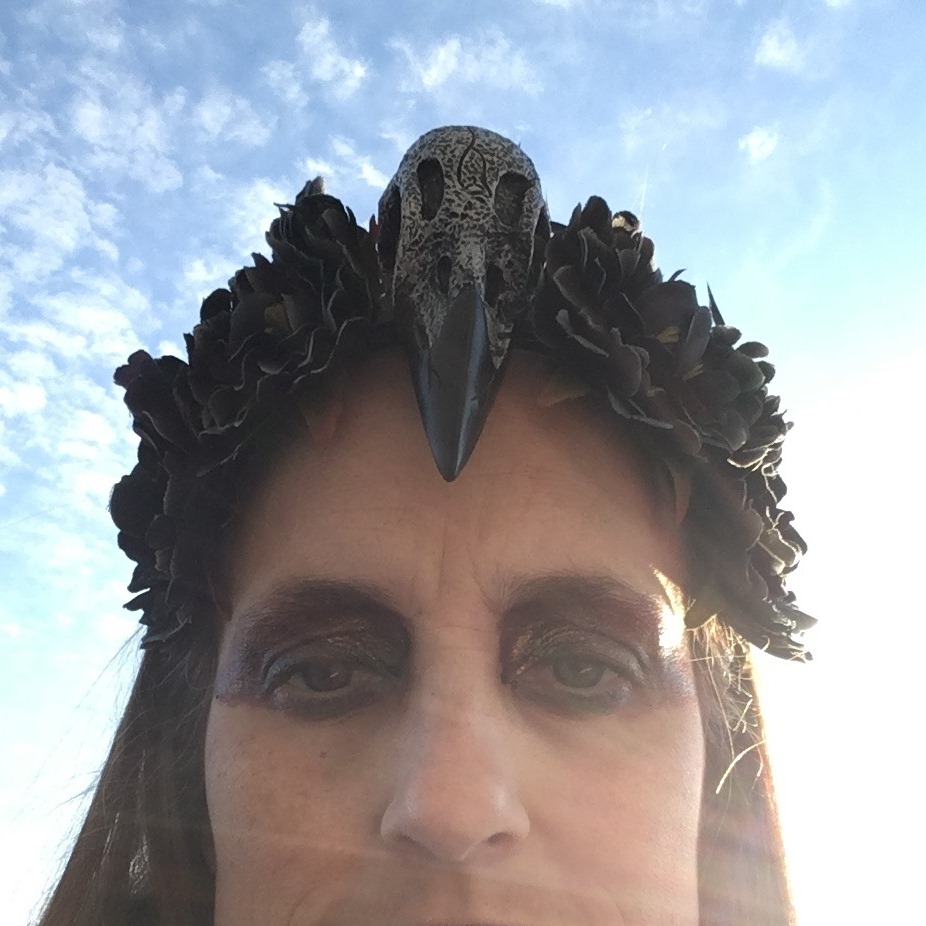
If you enjoyed this werewolf wolfwere wolfwhatever saga, feel free to check out more of Jennifer Weigel’s work here on Haunted MTL or here on her website.



